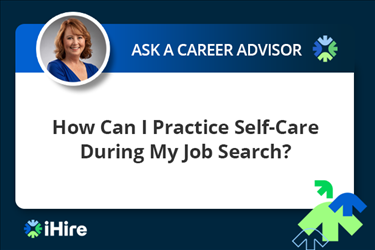- Job Seeker Resources
- |
- Last Updated: February 08, 2024

6 Strategies for Overcoming Healthcare Burnout in Our Post-COVID World
It is no secret that burnout has become an increasingly alarming trend in healthcare, especially in the wake of the COVID-19 pandemic. Healthcare professionals were under extreme pressure to deliver quality care while managing the overwhelming demand for medical services. The fallout of the pandemic has taken its toll on healthcare providers, leading to personal and professional healthcare burnout. This burnout epidemic is even becoming a significant problem for job seekers looking for healthcare careers that provide them with career fulfillment.
But as things change, it's important to be able to see the improvements. In order to do this, we must change our personal narrative and find ways to cope with healthcare burnout. If you are a current healthcare professional with a negative narrative around the healthcare industry leading to extreme healthcare burnout, this article is for you. It will discuss how to adjust your reactions to new initiatives to combat healthcare burnout and recognize when working conditions improve.
Where Did Healthcare Burnout Begin?
It's important to understand the root causes of healthcare burnout in order to effectively cope with and address it. Healthcare burnout can stem from a variety of factors, including high workload, long hours, lack of resources, challenging patients, and bureaucratic red tape. These stressors can quickly add up and lead to exhaustion, frustration, and a feeling of being overwhelmed. This, in turn, leads to a lack of motivation at work.
The issue of healthcare burnout is further compounded by the fact that healthcare professionals are often working in a high-stakes, life-or-death industry. The constant pressure to provide perfect care and maintain high levels of performance can take a toll on one's mental health.
It's common to say that healthcare burnout began (and will end) with the COVID-19 pandemic. However, healthcare burnout has been an ever-present issue. The COVID-19 pandemic simply amplified and worsened existing problems within the healthcare industry, leading to a widespread burnout epidemic. The benefit of this topic coming to light, though, is that healthcare organizations are now taking it more seriously than ever before. Even policymakers are recognizing the importance of addressing and preventing healthcare burnout, as it is now part of the Quintuple Aim.
As the healthcare industry works to address burnout, it is important healthcare workers are in a mindset to see and appreciate these efforts to rediscover motivation at work. This requires a change in personal narrative and coping strategies.
Will the Healthcare Industry Get Better for Workers?
Not all change is progress, and in the healthcare industry, it can feel like things are getting worse rather than better. However, it's important to recognize that change takes time and effort. With the increased attention on healthcare burnout and its impact on both individuals and the industry as a whole, there is hope for improvement.
Effectively addressing the factors that lead to healthcare burnout will take not only time but also trial and error. For healthcare workers already experiencing burnout, these constant initiatives and iterations can be discouraging and frustrating. But we must reset our mindset to begin to see these changes as progress and steps toward true career fulfillment in the healthcare industry.
A change in mindset does not mean ignoring or minimizing the struggles and difficulties faced in the healthcare industry. Rather, it is about shifting focus to appreciate small steps toward improvement and recognize where positive change is possible.
6 Strategies for Overcoming Healthcare Burnout
To overcome healthcare burnout, the first step is to believe positive change is possible. There will always be both negative and positive aspects of healthcare. Refocusing on the positive can be life-giving in the healthcare industry, and these six strategies can help.
Acknowledge the Challenges and Opportunities
The healthcare industry is continually evolving, and over time, it has become more complex. It is crucial to understand that personal and professional challenges are inevitable, but they provide opportunities for growth and learning that can lead to self-improvement. Recognizing the challenges also helps identify the current trends in healthcare and shifts to make appropriate changes to relieve the pressures on healthcare providers. Acknowledging that changes are needed in the healthcare industry is the first step in creating new opportunities to relieve healthcare burnout. You never know – you may be the next great healthcare leader.

Remember Your Motivation at Work
The path to overcoming burnout in healthcare begins with gaining clarity about why you chose to work in the healthcare industry in the first place. Healthcare is a noble profession that calls for individuals with high levels of dedication, compassion, and empathy. It also offers a plethora of rewarding career opportunities that allow individuals to make a positive impact on other people's lives. Spend some time reflecting on the reasons that drove you into the industry and what motivates you to keep pursuing your healthcare career. Digging deep into your source of motivation at work can give you the strength to overcome fatigue and push through challenging days.
Prioritize Self-Care
As a healthcare professional, it's essential to prioritize self-care to avoid burnout. This means taking breaks when needed, setting boundaries for work-life balance, and engaging in activities that bring joy and fulfillment outside of work. Self-care also includes taking care of your physical health by staying active and eating well. Part of the reason self-care is difficult is because healthcare professionals are often motivated by the approval and joy of others. Taking care of yourself may at times make things difficult for others; but remember, you must first take care of yourself before you can effectively care for others. When you truly prioritize self-care, you will have more energy and resilience to handle the demands of your job.
Celebrate Daily
There are always going to be negative things to focus on in the healthcare industry, but there are also many positive things happening every day. Take time to celebrate them and express gratitude to others (and yourself!). Whether it's a successful surgery, a patient's recovery, or simply making a connection with a patient, these small wins deserve to be acknowledged and celebrated. By focusing on the positives and celebrating them, you can change your mindset from one of healthcare burnout to one of gratitude and appreciation. This is not only about creating a positive environment for others, but more importantly for your own long-term mental health.
Connect With Peers
Connecting with peers who understand the challenges of working in healthcare can be incredibly beneficial. They can provide support, share experiences, and offer advice on how to cope with healthcare burnout. Additionally, building meaningful relationships with colleagues can create a sense of community and belonging within the workplace, making it easier to navigate through difficult times. However, it's important to foster relationships with others who are striving to develop a positive mindset as well. Together, you can support each other and work towards creating a healthier work environment for all.
Find a Rewarding Career
Create your free account to explore our healthcare career sites, tools, and more.

Job Seeker Sign In
We Value Your Privacy
Seek Professional Support
The human mind was not built to handle the stress of constant life-altering situations alone. But that is the burden many healthcare professionals put on themselves. In your daily practice, you are exposed to suffering, pain, and even death. It is normal to feel overwhelmed and struggle with these experiences. Seeking professional support, whether it's through therapy, mentoring, or career coaching, can provide you with the tools and techniques to cope with healthcare burnout effectively. Remember, asking for help is not a sign of weakness but rather a sign of strength and self-awareness.
Will There Be Changes in Healthcare Burnout After COVID?
Healthcare burnout shouldn't be a badge of honor. Instead, it's essential to take steps to overcome it. The changes in the healthcare industry after COVID are up to you, a healthcare professional. The pandemic has highlighted the importance of prioritizing self-care, acknowledging challenges and opportunities, and seeking professional support. It's also brought to light the need for better work-life balance and resources for healthcare professionals.
As we move forward, it's essential to remember these lessons and continue advocating for positive change in the industry. By implementing these strategies and making small changes within our own workplaces, we can create a healthier and more sustainable environment for current and future healthcare professionals.
Sign In or Register to access all articles and insider tips for help in your job search.
Search for iHire Jobs
RELATED JOBS
RELATED RESOURCES
Find the Right Job Faster
- Get personalized job matches sent to your inbox every day
- Connect directly with employers before your competition
- Advance your career with expert advice on interviewing, salary negotiation, and more
We value your privacy




